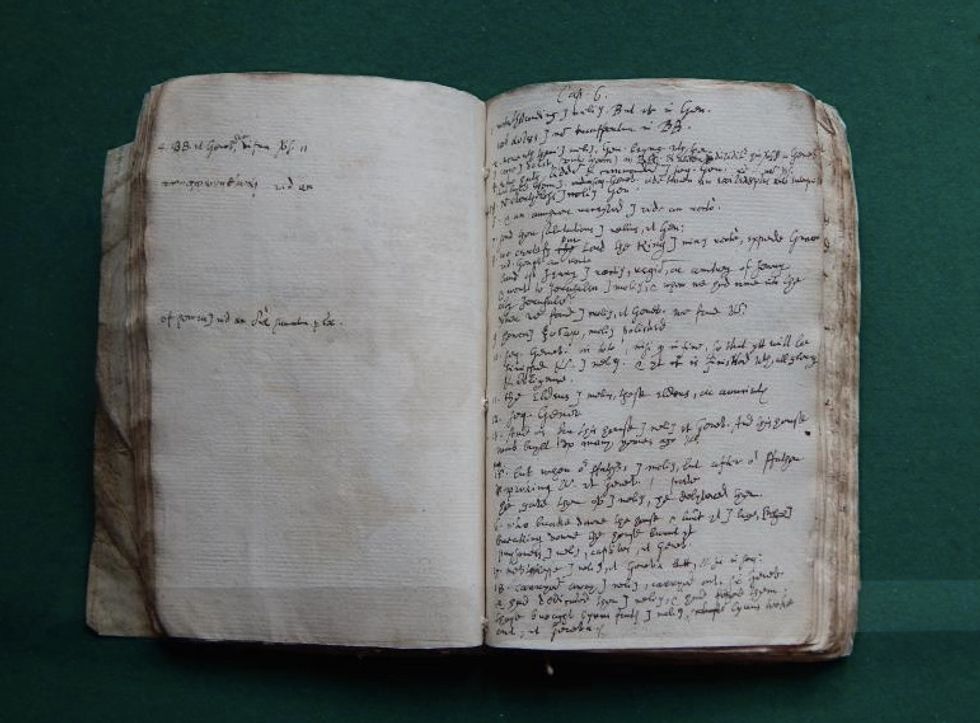
© 2025 Blaze Media LLC. All rights reserved.
Professor Discovers Major Historical — and Biblical — Find Inside Notebook That Sat Virtually Untouched for Centuries
October 16, 2015
"Thunderstruck, leap-out-of-bathtub moment."
A New Jersey professor has uncovered what is believed to be the earliest known draft of a portion of the King James Bible — one of the most notable discoveries surrounding the historic Bible translation in decades.
Dr. Jeffrey Alan Miller, an assistant English professor at Montclair State University in Montclair, New Jersey, was going through notebooks at the University of Cambridge last year that belonged to Samual Ward, an academic who lived from 1572-1643 and who was part of a team at the college that translated the Bible and Apocrypha — a collection of disputed books not included in Old and New Testament canon.
Ward's notes had been sitting as part of a collection at the university for centuries and had been virtually untouched — that is until 1985.
"That year, Margo Todd published a landmark study of the collection, in which she supplied the Ward manuscripts with the alphabetical classifications they now possess and gave a brief description of each manuscript’s contents," Miller explained in a Times Literary Supplement article. "Todd described MS Ward B as containing a 'verse-by-verse biblical commentary,' with 'Greek word studies, and some Hebrew notes.'"

Miller, who was researching for an essay about Ward, decided to look at the notebook for himself and, at first, he didn't notice much outside of what had previously been indicated by Todd.
But as he looked a bit deeper, Miller said that the "manuscript’s true significance suddenly came into focus."
The professor said that he realized that what was believed to be a "verse by verse" commentary was actually a draft of part of the King James version of the Apocrypha — a realization that he described as a "thunderstruck, leap-out-of-bathtub moment" in an interview with the New York Times.
Miller believes that the draft, which includes a complete version of the Apocryphal book of 1 Esdras as well as a partial version of the Wisdom of Solomon, can be dated to between 1604-1608, with notations about language leading him to believe that it was early in the translation process.
"The Samuel Ward draft ... reveals the complex interplay of individual and group translation involved in the composition of the King James Bible, as well as its close connection to the previous English translation known as the Bishops’ Bible," a press release reads. "It also helps to illuminate the role that Hebrew, Greek and Latin played in shaping the King James Bible’s iconic English."
Other experts have reportedly reviewed and verified Miller's finding, according to Montclair State University.

"It represents not just the earliest draft of the KJB now known to survive, but one utterly unlike any previously found," Miller explained. "Ward’s draft alone bears all the signs of having been a first draft, just as it alone can be definitively said to be in the hand of one of the King James translators themselves."
He continued, "It also stands as the only draft now known to survive of any part of the Apocrypha in the KJB, and the only draft yet to be discovered in Cambridge, one of the three initial centres of the Bible’s composition."
Considering that the King James Bible is the "most widely read work in English of all time," Miller said that the finding will help understand how a profound culture achievement — actually assembling the book — came to fruition.
The King James Bible was produced by teams of translators who worked together in Cambridge, Oxford and London, publishing the completed work in 1611. Only three originals manuscripts had been located before Miller's discovery, according to the New York Times.
Read more about the discovery here.
(H/T: New York Times)
Follow the author of this story on Twitter and Facebook:
Want to leave a tip?
We answer to you. Help keep our content free of advertisers and big tech censorship by leaving a tip today.
Want to join the conversation?
Already a subscriber?
Billy Hallowell is a digital TV host and interviewer for Faithwire and CBN News and the co-host of CBN’s "Quick Start Podcast."
Billy Hallowell
Billy Hallowell is a digital TV host and interviewer for Faithwire and CBN News and the co-host of CBN’s "Quick Start Podcast."
more stories
Sign up for the Blaze newsletter
By signing up, you agree to our Privacy Policy and Terms of Use, and agree to receive content that may sometimes include advertisements. You may opt out at any time.
Related Content
© 2025 Blaze Media LLC. All rights reserved.
Get the stories that matter most delivered directly to your inbox.
By signing up, you agree to our Privacy Policy and Terms of Use, and agree to receive content that may sometimes include advertisements. You may opt out at any time.





